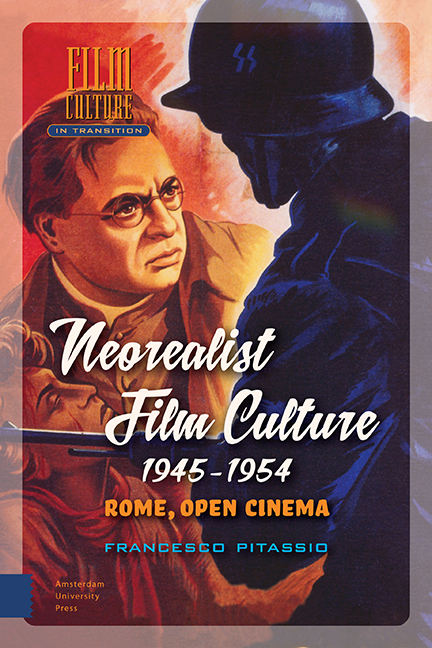Book contents
- Frontmatter
- Contents
- Acknowledgements
- Introduction: An Uncertain Direction. Neorealist Cinema and Transitional Culture
- 1 Locating the Real: National, International, and Transnational Neorealism
- 2 Lies of Memory: Post-war Culture, Remembrance, and Documentary Filmmaking
- 3 Looking at the Images: Neorealist Visual Culture
- 4 Actors, Non-professional Actors, Starlets, and Stars: Film Performance in the Neorealist era
- Bibliography
- About the Author
- Name Index
- Film Index
Introduction: An Uncertain Direction. Neorealist Cinema and Transitional Culture
Published online by Cambridge University Press: 21 November 2020
- Frontmatter
- Contents
- Acknowledgements
- Introduction: An Uncertain Direction. Neorealist Cinema and Transitional Culture
- 1 Locating the Real: National, International, and Transnational Neorealism
- 2 Lies of Memory: Post-war Culture, Remembrance, and Documentary Filmmaking
- 3 Looking at the Images: Neorealist Visual Culture
- 4 Actors, Non-professional Actors, Starlets, and Stars: Film Performance in the Neorealist era
- Bibliography
- About the Author
- Name Index
- Film Index
Summary
A young kid in rags is on the corner of a street selling cigarettes on the black market. A puppy keeps him company. A flashy woman, black-haired, wearing heels and heavy make-up, approaches. A blonde, dull-looking American soldier is with her. She notices the child and wants to have a smoke. She rummages through the box the kid is holding until she pulls out of it a cigar, which she lights up. A policeman shows up: the couple flees without paying the kid, whom the policeman chases, until the latter hits a lamppost. After losing his goods and his money, the kid travels back home by jumping onto the bumper of a bus, together with his dog. He finally gets to a shanty, where his barrack is located. Just a loaf of stale bread awaits him for dinner, which he shares with the dog. While the wind howls, he gets in bed with the animal. As he falls asleep, he starts dreaming: he climbs up a ladder coming out of a hole in the roof and admires the city's skyline. Then the ladder extends all the way up to the sky. The child ascends it and finally is high above. He starts picking up beautiful stars. But as he is ready to leave, a voice stops him, saying that he cannot bring the stars home but that he can stay if he wants to, which he does. In the morning, down on earth, the dog tries to wake his master, to no avail. It begins to howl (Fig. 1).
The few lines above describe a peculiar film, directed by Italian animator Francesco Maurizio Guido (aka Gibba) between 1946 and 1947. Its title is L’ultimo sciuscia (The last shoeshine) and it is an animation short that Alfa Film, a new company located on the Italian Riviera, produced under precarious circumstances. While in Rome in 1944, the young Gibba attempted to direct an animation short called Hello Jeep! which should welcome the American troops. The short was meant to be created together with Federico Fellini, who at the time was also involved in the production of Roma citta aperta (Rome, Open City, Roberto Rossellini, 1945), but unfortunately they were never able to complete the project.
- Type
- Chapter
- Information
- Neorealist Film Culture, 1945–1954Rome, Open Cinema, pp. 13 - 36Publisher: Amsterdam University PressPrint publication year: 2019



